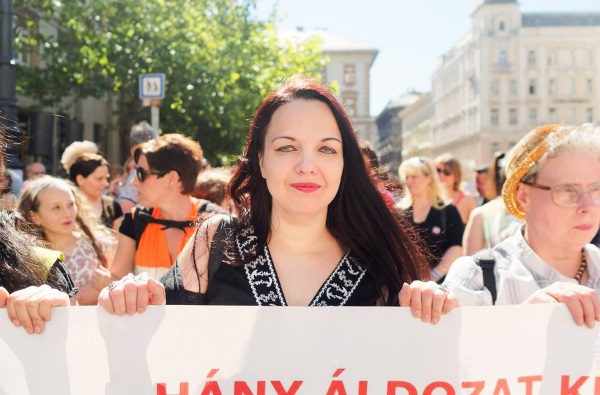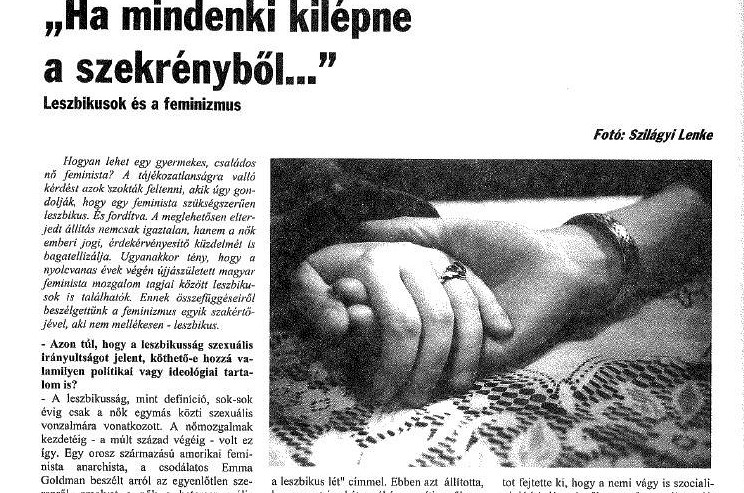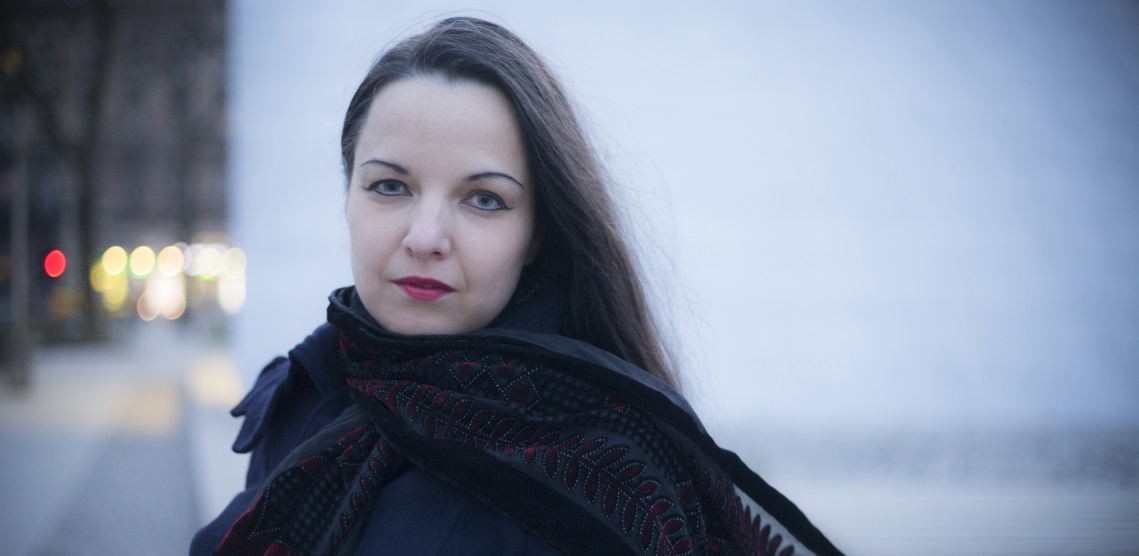Rita Antoni works as a journalist, she is also the chairman of Nőkért - For Women Association (the Association’s main goal is to spread the history and achievements of feminism, and to stand up against violence against women as well as general sexism). She held a lecture in Szeged as part of the LGBTQ History Month on “Lesbian women in the feminist movement” where she talked about the history of the feminist movement from the beginnings both in Europe and in the United States. She mentioned several lesbian women who fought to spread the idea of women’s equality. After her lecture, we had a talk with Rita about feminism in Hungary, the current situation and the future of LGBTQ+ people.
How do you think feminist and lesbian women can help each other in the current Hungarian political and social climate?
Taking into account that the „gender panic” (the fight against gender-ideology) has reached Hungary to such a degree that even the ratification of the Istanbul Convention (on preventing and combating violence against women and domestic violence) has been put on hold due to the government’s opposition to gender-ideology, I feel that what minority groups need now more than ever is to join forces. By minority groups I mean everyone who is not in favour of the government: those fighting against poverty and racism, those demanding equal rights for everyone, and us, rowing the „gender-boat”, meaning we do not fit into the government’s idea of womanhood and family model (feminists, LGBTQ people and even conformists living in solidarity with others). Me and my fellow admins have been operating a Facebook group called “GenderNest - feminist and LGBTQ community space” for two years where these kind of people can form a community.
We believe that all arising problems and any conflict of laws can and must be solved by open communication.
In my opinion, feminists and lesbians in Hungary work well together on an institutional level: Labrisz Lesbian Association is a member organization of the Hungarian Women's Lobby feminist umbrella-organization, with whom us, Nőkért - For Women Association work together frequently as well.
That’s true, but we can say that there are problems as well.
Yes. I feel it especially damaging and unnecessarily polarizing when those claiming to be on the left are trying to force a light version of feminism on conservatives, the general public and (with not much success so far) on the LGBTQ movement - by throwing out the most problematic groups from the boat. This means disowning, attacking and discrediting the very existence of transsexuals, non-binary and queer people.
It doesn’t matter that they are doing this in the name of feminism (the radical branch, that excludes transgendered people), they are still practically siding with gender-crazed conservatives. For example, both of these groups are spreading panic in connection with treating transgendered children without observing the facts or taking into account that it is highly unlikely that treating transgendered children will become reality any time soon in Hungary.
I believe that in the current situation the right direction is solidarity, and the discussion should mainly focus on the Hungarian problems at hand.
My personal experience is that there is no point in trying to negotiate with conservative feminists, when those claiming to be conservatives cannot be agreed upon something so basic and obvious as the Istanbul Convention. And why not? Because the word “gender” is in it!
What we should understand is that instead of frowning upon a word (or fighting against gender), we should realize that gender (roles) as in the totality of the societal stereotypes connected to our gender (our “principle” as you may say - note: Ákos, a singer favoured by the Hungarian conservative parties said in an interview in 2015 that women should not earn as much as men do, and that their main role is to be in union with a man and give birth to children. The word became infamous since.) and our inner gender-identity are two different concepts. Ignorance and conscious mixing up of gender roles and identity breeds numerous misunderstandings and unnecessary, time and energy-consuming arguments. I believe that the inclusive point of view of qlit.hu is leading an ideal example (although I don't use an asterix as a note).
From the perspective of LGBTQ people and women, the ratification of the Istanbul Convention would be vital as domestic violence can occur in non-heterosexual relationships as well. In what way could accepting the Convention help?
The Istanbul Convention does include (among other groups of victims) LGBTQ people - but there’s still scarce discussion about violence in LGBTQ relationships, even though it’s an existing problem. Among lesbian couples, verbal and psychological violence is more common that physical - especially when power imbalances between the parties occur (eg. coming from different financial or social backgrounds, or when one of the partners are not out, and therefore can be blackmailed) can lead to aggressive forms of oppression. This makes it hard to leave the relationship, and it’s important that the oppressed get the help they need (right now in Hungary you can ask for help from Háttér Society, the oldest and largest LGBTQ NGO in Hungary that operates telephone hotlines and offers legal aid for those in need).

Adapting the Convention to the Hungarian law system would be especially useful as it contains all the techniques that have proven to be effective abroad for prevention, dealing with crimes as well as avoiding repeated offences. It ordains, for example, that shelters should be set up for the victims; professionals, policemen, judges, prosecutors and child protection-service workers should be specially trained to treat victims; intervention and re-socializing programs should be implemented for the offenders and so on.
These are hands-on and expensive measures, and that, in itself, explains the government’s hesitation. However, I do not think this is the real reason behind not wanting to ratify the convention. It’s more its ideological base: the equality of genders. Prevention methods include - with the help of media and civil societies, - campaigns for raising awareness of the problems, and the equality of genders set into the national curriculum - how far are we from these ideas when all we do is lead a witch-hunt against NGOs and force a conservative idea of womanhood on everybody? When saying “woman” is like a curse word and policies including women are just a part of family policies? (And we should be incredibly careful with phrases like “equal, but not the same”, because it may sound innocent, but it is a slippery slope to essentialism and sending women to “their places”.
As much as it doesn’t align with the government’s ideology, we will not stop pressuring the legislation until they ratify the Convention, as the compliance with the measures in it could help save human lives. It’s enough to observe the number of victims compared to the overall population of a country: if the level of intervention and prevention could reach the level of that in the countries where the protection of victims are better than in Hungary (in Spain, Germany or England for example), then the number of victims per year could go down from 50 to 16-18.
What can we do until the Convention gets ratified?
I hope that we will be able to work in a better political climate soon, but if not, we can always spread our knowledge on the history of feminism and LGBTQ people, as we can be inspired by our predecessors even in darker times.
Even if we need to wait for the time when same-sex couples are able to get married, we should at least reach a point where laws align with the already existing practices.
There are several lesbian couples who are raising children together, but according to the law, they cannot be both legal parents. We also cannot stand by when couples are denied adoption because of their sexual preferences, as it happened in 2016 with a lesbian couple from Pécs.
How has the relationship between lesbians and feminists been evolving in Hungary?
The relationship between lesbians and feminists and those entering the movement has had its ups and downs, and they have different opinions up until today. There were numerous lesbian women working in the first wave of feminism, but they did not put their sexual orientation in the spotlight, their main goal was to acquire the right to vote, everything else was secondary. As I said, there were several lesbian women in the movement like Eva Gore-Booth and Esther Roper who fought for the rights of working women, Frances Power-Cobbe who was the first to write about domestic violence and who was also an animal rights advocate. Or Linda Gustava Heymann who fought against prostitution and who lived her whole life as a couple with Anita Augspurg. They actually are buried together.
Among the British suffragettes, the charismatic composer of the Suffragette Anthem, Dame Ethel Smyth was openly lesbian. Anna Rühling has showed her resentment in the beginning of the 20th century, about lesbian women not getting enough credit for their role in the movement. Third wave feminism had already opened up to women with special, marginalized backgrounds.
Feminists started to fear that the discrimination against lesbians and the stereotypes attached to them could be associated with the entirety of the feminist movement. Later, the relationship became better: Vera Bozzi’s interview titled “If everyone would step out of the closet…” („Ha mindenki kilépne a szekrényből…”) with a lesbian who asked for anonymity in the Hungarian feminist paper of the 90’s “Nőszemély” (pejorative word for women) was a very important milestone.

I have to admit I had my doubts as well in the early period of Nőkért.hu (the homepage of the Association), even though as a bisexual I am half affected as well. I have thought for years that diversity is very important for feminist associations, we need to hear as many different experiences and points-of-view as possible. Feminism represents all women, it’s inevitable to represent the interests of lesbian women as well, so the argument is totally unintelligible.
Do you have any recommended books for those interested in the topic of LGBTQ+ and feminism?
I usually recommend Simone de Beauvoir’s book The Second Sex as an introduction: it was written in 1949, but essentially, it still stands its ground. For the younger generation trying to learn about feminism, Caitlin Moran’s book How to be a Woman is great. Those familiar with the bases of feminism and just want to learn about different topics I recommend my online searchable genderbiblogrpahy, Sisterteque (Nővértéka) - it’s only in Hungaran though.
Those who want to read higher literature, I would recommend to take a look at the recommended literature list on Nőkért.hu. If I have to mention one or two books, I think lesbians would love Fannie Flagg’s Fried Green Tomatoes (and the movie based on the book), I also recommend Marilyn French’s book, The Women's Room (a little dark, but very instructive). It’s about housewives in 60’s America, and you also get introduced to a lesbian character. There’s another one, but it’s not feminist in the least, nevertheless it’s a very interesting, beautifully written classical lesbian roman - Radclyffe Hall’s The Well of Loneliness.
We can see that the relationship between lesbian women and feminism up until now is still a divisive topic. However, we should all work together to create a brighter future with equal rights for women and LGBTQ+ people in the coming years.
The cover picture was taken by Fanni Szilágyi
Translated by Dóra Bajnóczi

